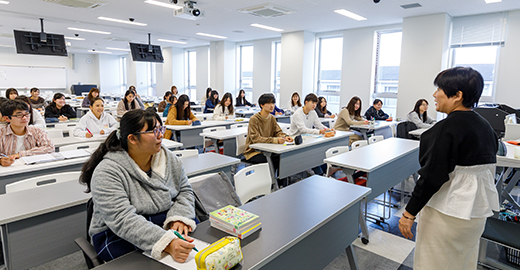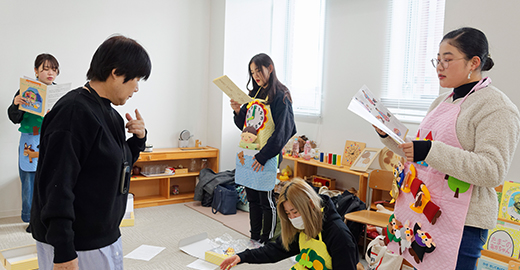School of Nursing
Educational Purpose
The purpose of the School of Nursing is to develop nursing professionals who respect life, have deep insight into human dignity and rights, and contribute to the improvement of people's health and welfare in accordance with the founding principles of the university. In other words, we aim to create an environment that fosters nurses who have a flexible perspective, an expert level of knowledge, reliable skills, and who are compassionate, kind-hearted professionals who have faith in their ability to serve and work alongside their patients.

Educational Goals
We aim to develop students’ skills through a Bachelor of Nursing. The educational goals of the School of Nursing are described in the following seven points.
(1) To develop a broad perspective and the ability to understand multiple languages.
(2) To acquire knowledge that provides the basis for nursing care.
(3) To acquire competency in human caring based on solid ethics.
(4) To acquire basic knowledge and skills in specialized areas of nursing.
(5) To develop the ability to assess health, medical care, and welfare from multiple perspectives, and to collaborate and cooperate with the various professions involved.
(6) To develop the ability to work as a nurse, not just in the local community, but in international society as well, by taking into account different cultures.
(7) To develop the ability to contribute to society as a professional nurse with comprehensive knowledge and practical skills through continuous self-improvement.
Strengths of Our Department
1. An Educational Program that Fosters High Quality Nursing Expertise
From the establishment of curriculums unique to our university, such as Global Health Nursing and Disaster Nursing, we offer many substantial practical training curricula from our students' first year onwards. Due to having a graduate school, students can easily communicate and deepen their learning with graduate school faculty members who are experts in the four fields of nursing: education and management, adult and elderly nursing, support for people (including children) with disabilities, and community nursing.
The University’s Unique Curriculum
Disaster Nursing With the aim of fostering high quality nurses skilled in disaster relief, students learn triage and other skills used in actual disaster situations in the classroom. This makes sure they can respond immediately in times of disaster.
Global Health Nursing Students of Himeji University have the unique ability to comprehensively study global nursing through our international network. The program provides educational opportunities for students to learn extensively about theories and applications in the field of international nursing. By systematizing nurses’ experiences in overseas rescue and relief, students are able to advance their careers in international and disaster nursing activities.
2. An Educational Environment that Fosters High Quality Practical Ability
The School of Nursing is equipped with the latest educational facilities. This includes SimMan; a simulation doll that can be used to set up all kinds of patient conditions. We also have SimJunior and SimBaby which simulate the physical conditions of children and babies. On top of that, our university has a comprehensive maternity simulator too. All kinds of clinical signs and symptoms of patients can be realistically reproduced in highly effective scenarios to help our students acquire practical skills.





